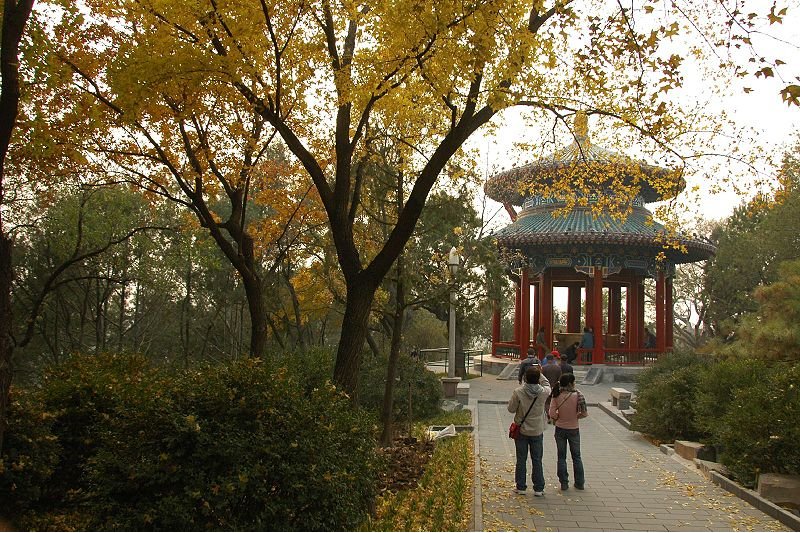 Jingshan Park, Beijing
Jingshan Park, BeijingSource: http://commons.wikimedia.org/wiki/File:Jingshanpic2.jpg
Author: gongfu_king

Jingshan Park is a large park situated on Beijing's north-south axis. It is located immediately to the north of the Forbidden City.
Jingshan Park was built during the Yuan Dynasty (1279-1368). Until the fall of the Qing Dynasty, Jingshan Park was part of the Forbidden City complex and hence was restricted to imperial use.
The hill at Jingshan Park were created from the rubble when the moats of the Forbidden City were dug during the reign of the Yongle emperor of the Ming Dynasty. During the Ming Dynasty, the hill was called Wansui Shan, or Long Life Hill. During the Qing Dynasty, it was renamed Jingshan, meaning Viewpoint or Prospect Hill. Foreign residents of Beijing at that time called it Coal Hill, on the rumour that coal was stored at the foot of the hill.
The hill at Jingshan Park is said to protect the imperial palaces at the Forbidden City against bad feng shui from the north. Nonetheless it failed to save the last Ming emperor Chongzhen, who hanged himself from a tree in the park in 1644, just as rebel troops were marching into Beijing. There is a tree that marks that spot - it isn't the original tree, though.
There are many pavilions and halls at Jingshan Park. The Wanchun Pavilion is the most popular spot in the park, for it offers splended views into the Forbidden City.
Looking for information on Penang? Use this Map of Roads in Penang to zoom in on information about Penang, brought to you road by road.

Author: gongfu_king

Jingshan Park is a large park situated on Beijing's north-south axis. It is located immediately to the north of the Forbidden City.
Jingshan Park was built during the Yuan Dynasty (1279-1368). Until the fall of the Qing Dynasty, Jingshan Park was part of the Forbidden City complex and hence was restricted to imperial use.
The hill at Jingshan Park were created from the rubble when the moats of the Forbidden City were dug during the reign of the Yongle emperor of the Ming Dynasty. During the Ming Dynasty, the hill was called Wansui Shan, or Long Life Hill. During the Qing Dynasty, it was renamed Jingshan, meaning Viewpoint or Prospect Hill. Foreign residents of Beijing at that time called it Coal Hill, on the rumour that coal was stored at the foot of the hill.
The hill at Jingshan Park is said to protect the imperial palaces at the Forbidden City against bad feng shui from the north. Nonetheless it failed to save the last Ming emperor Chongzhen, who hanged himself from a tree in the park in 1644, just as rebel troops were marching into Beijing. There is a tree that marks that spot - it isn't the original tree, though.
There are many pavilions and halls at Jingshan Park. The Wanchun Pavilion is the most popular spot in the park, for it offers splended views into the Forbidden City.
How to reach Jingshan Park
Take the subway to the Tiananmen West subway station. Latest updates on Penang Travel Tips
Latest updates on Penang Travel Tips
 Map of Roads in Penang
Map of Roads in Penang
Looking for information on Penang? Use this Map of Roads in Penang to zoom in on information about Penang, brought to you road by road.
Copyright © 2003-2025 Timothy Tye. All Rights Reserved.

 Go Back
Go Back